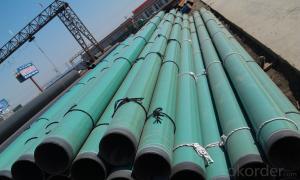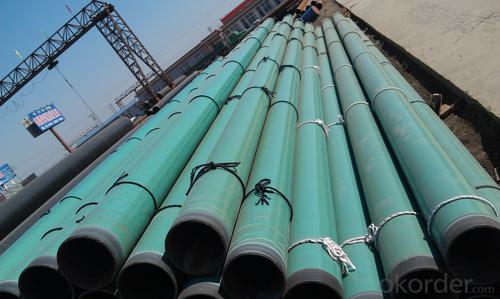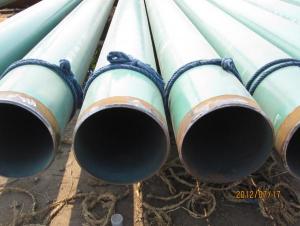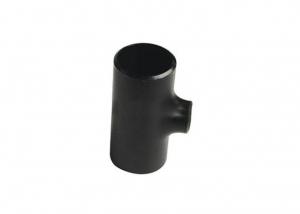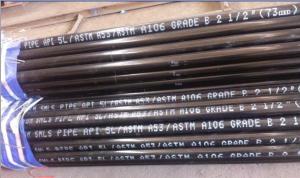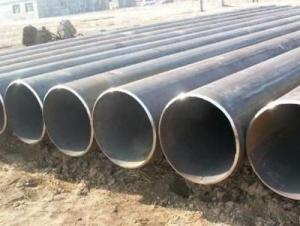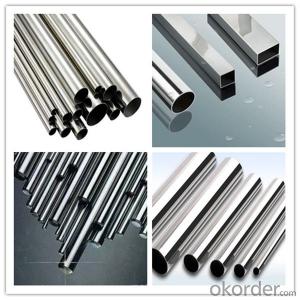Carbon Steel Seamless Pipe with FBE coating
- Loading Port:
- China Main Port
- Payment Terms:
- TT OR LC
- Min Order Qty:
- -
- Supply Capability:
- -
OKorder Service Pledge
OKorder Financial Service
You Might Also Like
1.Specification:
Iterm | Seamless steel pipe/tube | |
Size | OD:21.3-610mm WT:2.24-30.96mm | |
Length | 5.8-12m | |
Application | Usage for fluid transportation ,structure, and so on | |
Surface Treatment | 3PE/2PE,3PP/2PP,FBE,EPOXY COATING | |
Packing | Hexagon bundle with waterproof packing or as client's requirement | |
API | Standard | API 5L |
material | Gr.B, X42,X46,X52,X56,X60,X65,X70 | |
ASTM | Standard | ASTM A106, ASTM A53 |
material | A106(A B), A53(AB) | |
DIN | Standard | DIN1626,DIN17175,DIN1629 |
material | St37,st42,st35.8,st45-8,st45-4 | |
JIS | Standard | JISG 3454,JISG3456,JISG3461,JISG3455 |
material | STPG42,STB42,STS 42 | |
GB | Standard | GB 8163/8162 |
material | 20#,10#,45#,Q345,20Cr,40Cr,12CrMov | |
Payment terms | TT or L/C | |
Delivery time | Within 30 days after receive the prepayment by TT | |
ANTICORROSION STEEL PIPE SPECIFICATION :
1. 3PE COATING
3. FEB COATING
STANDARD: SY/T0315-97,SY/T0315-2005,CAN/CSA-Z245.20-M98,DIN30671,Q/CNPC38-2002
4. CEMENT MORTAR COATING
- Q: How do you calculate the pipe thermal expansion for steel pipes?
- To calculate the pipe thermal expansion for steel pipes, you need to consider the coefficient of thermal expansion (CTE) of the material, the temperature change, and the length of the pipe. The CTE is a measure of how much a material expands or contracts with temperature changes. For steel, the average CTE is typically around 12 x 10^-6 per degree Fahrenheit (or 6.5 x 10^-6 per degree Celsius). However, this value can vary depending on the specific grade of steel. Next, determine the temperature change that the pipe will experience. This can be the difference between the operating temperature and the ambient temperature, or the change in temperature due to the fluid or gas flowing through the pipe. Finally, calculate the thermal expansion using the formula: Thermal Expansion = CTE x Length x Temperature Change Where: - CTE is the coefficient of thermal expansion - Length is the length of the pipe - Temperature Change is the difference in temperature For example, if you have a steel pipe with a length of 10 meters (32.8 feet) and a temperature change of 100 degrees Celsius (180 degrees Fahrenheit), and assuming a CTE of 12 x 10^-6 per degree Celsius, the thermal expansion would be: Thermal Expansion = 12 x 10^-6 x 10 x 100 = 0.012 meters (or 12 millimeters) This means the pipe would expand by 12 millimeters due to the temperature change. It's important to note that this calculation provides an estimate of the thermal expansion, but other factors such as pipe supports, restraints, and the specific application should also be considered to ensure the proper design and installation of the steel pipe system.
- Q: Can steel pipes be used for steam applications?
- Yes, steel pipes can be used for steam applications. Steel pipes are known for their high strength and durability, making them suitable for carrying steam at high temperatures and pressures. They are resistant to corrosion and can withstand the harsh conditions of steam systems, making them a popular choice in various industries such as power generation, oil and gas, and chemical processing.
- Q: Can steel pipes be used for transporting hazardous materials?
- Yes, steel pipes can be used for transporting hazardous materials. Steel is highly durable and can withstand the pressure and temperature requirements of hazardous material transportation. Additionally, steel pipes can provide a reliable barrier against leaks and spills, minimizing the risk of environmental contamination. However, it is essential to consider the specific properties and compatibility of the hazardous material being transported to ensure the steel pipes are suitable for the task.
- Q: How do steel pipes perform in extreme weather conditions?
- Steel pipes perform well in extreme weather conditions due to their high strength, durability, and resistance to corrosion. They can withstand extreme temperatures, heavy winds, and harsh climates, making them a reliable choice for various industries and applications.
- Q: What is the purpose of pipe flanges in steel pipes?
- The purpose of pipe flanges in steel pipes is to provide a secure and leak-proof connection between two pipes or fittings. Flanges act as a connection point, allowing easy assembly and disassembly of pipes while ensuring a tight seal to prevent any leakage or loss of fluid or gas.
- Q: What is an electric welded pipe (EFW)? Seek help!
- Pipe and pipe fittings should be suitable for the gap, usually with micro force insertion is appropriate, the gap is too large or too small will affect the quality of the interface.Check the depth of the plug and slip the spigot into the socket and position correctly.
- Q: Can steel pipes be used for drinking water supply?
- Drinking water supply can indeed utilize steel pipes. For water distribution systems, steel pipes are widely employed owing to their robustness, longevity, and capacity to endure high pressures. Nevertheless, it is crucial to highlight that the steel employed in these pipes must be purposefully engineered and endorsed for potable water applications. This ensures the water remains uncontaminated by any detrimental substances. Furthermore, regular inspections and appropriate upkeep are imperative to avert the development of rust or corrosion, which may impact water quality.
- Q: What are the different methods of welding steel pipes?
- There are several different methods of welding steel pipes, including shielded metal arc welding (SMAW), gas tungsten arc welding (GTAW), gas metal arc welding (GMAW), flux-cored arc welding (FCAW), and submerged arc welding (SAW). Each method has its own advantages and is used depending on factors such as the thickness of the pipes, the type of steel being welded, and the desired outcome.
- Q: What's the difference between seamless steel pipe and welded pipe?
- Welded steel pipe, also known as welded pipe, is made of steel or strip after the formation of welding welded steel pipe, usually 6 meters in length. Welded steel pipe production technology is simple, high production efficiency, varieties and specifications, equipment investment is less, but the general strength is lower than seamless steel pipe.
- Q: Are galvanized steel tubes the same as degaussing steel tubes?
- Also known as galvanized steel pipe, hot galvanized and galvanized two kinds, hot galvanized, zinc coating thickness, with uniform coating, adhesion, and long service life. The cost of galvanizing is low, the surface is not very smooth, and the corrosion resistance of itself is much worse than that of galvanized pipe.
Send your message to us
Carbon Steel Seamless Pipe with FBE coating
- Loading Port:
- China Main Port
- Payment Terms:
- TT OR LC
- Min Order Qty:
- -
- Supply Capability:
- -
OKorder Service Pledge
OKorder Financial Service
Similar products
Hot products
Hot Searches
Related keywords
